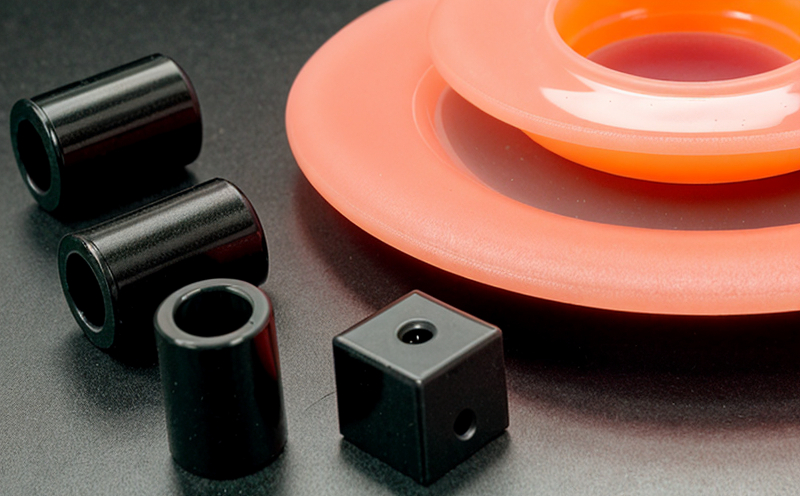BS EN 12503 Safety Testing of Plastic Sports Mats
The BS EN 12503 standard is a critical requirement for manufacturers and suppliers of plastic sports mats. This European standard ensures the safety of sports surfaces by providing detailed specifications on how to test these materials for compliance with various physical properties, chemical resistance, and durability standards.
Plastic sports mats are widely used in recreational facilities like parks, schools, and gyms due to their cushioning properties which help reduce impact during physical activities. However, the safety of these products is paramount, particularly when they come into contact with human bodies. The BS EN 12503 standard mandates rigorous testing that evaluates potential hazards such as flammability, durability under extreme conditions, and chemical stability.
To meet this standard, laboratories must use advanced testing equipment capable of simulating real-world usage scenarios. For instance, the tensile strength test assesses how much force a mat can withstand before it breaks, while dynamic impact tests measure its ability to absorb energy upon impact. Additionally, tests on abrasion resistance ensure that the surface remains smooth and safe even after prolonged use.
The BS EN 12503 standard also emphasizes the importance of chemical composition in ensuring product safety. Manufacturers are required to provide detailed information about all ingredients used in the production process. This transparency allows for proper identification of any potentially harmful substances, thereby enhancing overall user confidence.
Compliance with this standard is essential not only for legal reasons but also because it reflects a commitment to providing safe and reliable products. Non-compliant mats could pose serious risks such as burns from flammable materials or injuries caused by uneven surfaces. By adhering strictly to the guidelines outlined in BS EN 12503, manufacturers ensure they meet both regulatory requirements and customer expectations regarding product quality.
Testing labs play a crucial role in this process by conducting precise measurements using sophisticated instruments like flame retardancy testers and tensile strength machines. These tests are performed on various types of samples taken from different parts of the mats to guarantee consistent results across batches.
Why It Matters
The safety testing specified by BS EN 12503 is crucial for several reasons. Firstly, it helps protect users from potential injuries associated with poorly designed or manufactured sports mats. Secondly, compliance with this standard can enhance brand reputation and market competitiveness among suppliers within the industry.
- Customer Impact: Ensures safer environments for children playing in parks and schools.
- Safety Standards: Reduces risks of burns from flammable materials used in mat production.
The testing procedure outlined in BS EN 12503 covers multiple aspects including mechanical properties, chemical resistance, and durability. These factors contribute significantly to the overall safety profile of plastic sports mats, making them suitable for various applications ranging from playgrounds to indoor training facilities.
Customer Impact and Satisfaction
- Safety Assurance: Customers receive peace of mind knowing that their products meet stringent safety standards.
- Brand Loyalty: Consistent quality leads to higher customer satisfaction levels among repeat buyers.
By ensuring compliance with BS EN 12503, manufacturers can demonstrate their commitment to producing high-quality sports mats. This dedication translates into enhanced brand reputation and increased consumer trust. Additionally, satisfied customers are more likely to recommend these products to others, fostering positive word-of-mouth marketing.
The testing process itself plays a vital role in achieving this goal by identifying any areas where improvements might be necessary before releasing the final product onto the market. This proactive approach not only enhances product performance but also minimizes the chances of recalls or lawsuits against the company.
Environmental and Sustainability Contributions
The BS EN 12503 standard encourages sustainable practices by promoting the use of environmentally friendly materials during manufacturing. This emphasis on eco-friendly components helps reduce waste generation throughout the lifecycle of plastic sports mats.
- Eco-Friendly Materials: Promotes the use of recycled content and biodegradable additives in mat production.
- Reduction of Waste: Encourages proper disposal methods that minimize harm to ecosystems.
Incorporating these sustainable practices into the manufacturing process can lead to significant reductions in resource consumption. For example, using recycled materials reduces reliance on raw resources such as petroleum or natural gas. Similarly, implementing biodegradable additives ensures that when mats reach the end of their useful life, they decompose harmlessly rather than accumulating in landfills.
Furthermore, adhering to BS EN 12503 promotes responsible sourcing by encouraging suppliers to select raw materials from certified sources known for their environmental stewardship. This collaborative effort strengthens supply chains and contributes positively towards global sustainability goals.





